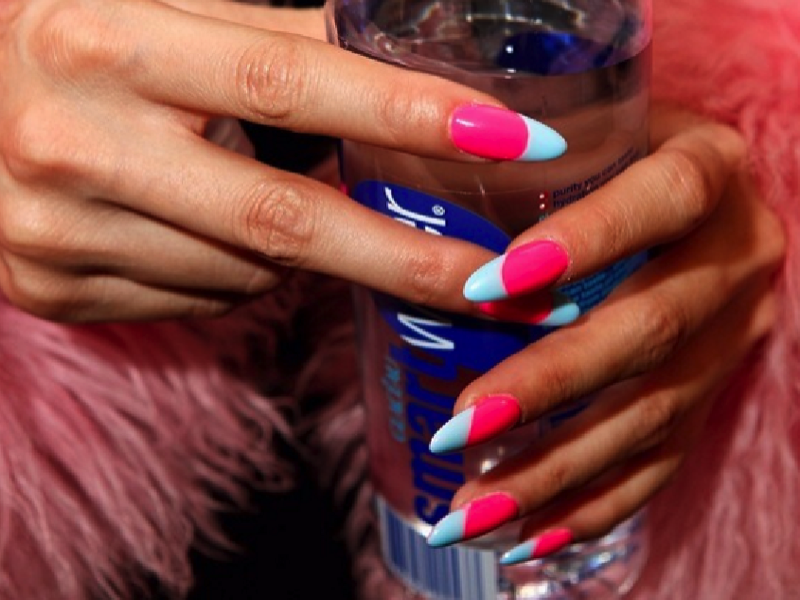Killer Coke News Archive | 2016
Campaign Reports | Newletter Archive
2003 | 2004 | 2005 | 2006 | 2007 | 2008 | 2009 | 2010 | 2011 | 2012 | 2013 | 2014 | 2015 | 2016 | 2017
"I used to work at Coca-Cola — sugary drinks should come with death warnings
"Companies know sugary drinks are cash cows, and refuse to take responsibility for the problems they create"
By Chris Hemmings, International Business Times, November 23, 2016
Read Article
"In the UK, nearly one in five children are obese by the time they reach secondary school, while another one in five are overweight. There are also tens of thousands of people under 19 with diabetes, of which obesity is the biggest risk factor...
"In an attempt to address the sugar tsunami washing over the nation, the Government announced a tax on sugary drinks in March...
"These companies simply can't accept they are in the wrong. They don't feel they should be punished for 'offering customers a choice' — a mantra I heard over and over again during my time working for Coca-Cola. Whilst they profess to promote 'sugar-free alternatives' or give money towards sport funds (both of which are true), the reality of their working practices is far different.
"At no point during my three years with Coca-Cola was I ever told to sell fewer bottles of full-sugar Coke, Fanta or Sprite — they were our 'core brands'. On our sales scorecard, full-sugar Fanta scored us far more points than Fanta Zero — they just don't see the less-unhealthy alternatives as being interchangeable."
"HC restrains Pepsi, Coca-Cola from using Tamirabarani water
"The petitioner contended that drawing of water for the bottling plants of these companies deprived farmers of their livelihood, who were unable to take up farming activities."
ETRetail.com (An initiative of The Economic Times), November 23, 2016
Read Article
"Madurai: The Madras High Court today restrained leading soft drink manufacturers Pepsi and Coca-Cola from using water drawn from the Tamirabarani river for their bottling plants in Tirunelveli district...
"The petitioner contended that drawing of water for the bottling plants of these companies deprived farmers of their livelihood, who were unable to take up farming activities."
"Dental experts slam Coca Cola truck amid fears over kids' teeth" by Jack Pitts, South Wales Evening Post, November 22, 2016
Read Article
"SWANSEA Bay dental health leaders have taken a pop at the Coca Cola Christmas truck over concerns of its harmful effect on youngsters' teeth,
"Abertawe Bro Morgannwg University (ABMU) Health Board nurses have joined up with health visitors to take on the marketing might of the drinks selling giant in a bid to stop a new generation getting hooked on fizzy drinks...
"But it's not just young children who have problems with their teeth. The Children's Dental Health Survey shows two-thirds of 15-year-olds in Wales have some level of tooth decay, with 14 per cent having five or more teeth affected."
For immediate release
Contact Pat Clark
Campaign to Stop Killer Coke
1-718-852-2808
Berlin, Germany: Ray Rogers of KillerCoke.org Berates Coca-Cola at Ethecon Foundation Event 11/19/16
The Ethecon Foundation is spotlighting its 2016 Black Planet Award to The Coca-Cola Company at its annual event being held in Berlin on Saturday, November 19, 2016 by inviting Campaign to Stop Killer Coke Director Ray Rogers from New York City to make a statement to the hundreds of social activists in attendance.
The International Ethecon Black Planet Award denounces companies, their executives and dominant shareholders responsible for shocking behavior that is destroying social well-being and the environment thus risking a "Black planet."
Comments made by Ray Rogers, Director, Campaign to Stop Killer Coke
Thank you Ethecon for inviting me to participate in this year's Black Planet Award presentation to Killer Coke: The Drink That Represses!
I wholeheartedly applaud Ethecon's decision to award its 2016 Black Planet Award to The Coca-Cola Company, its top executives and largest shareholder Warren Buffett. Coca-Cola is deserving of many such awards because of the harm the company and its bottlers worldwide continue to inflict on people and the planet.
Coca-Cola operates like a criminal syndicate, above the law and with impunity. Its executives lie about, try to cover-up and avoid responsibility for the company's well-documented human rights abuses including years of complicity in the systematic intimidation, kidnapping, torture and murder of union leaders and members of their families in Colombia and Guatemala.
Coca-Cola has repeatedly lied claiming that the United Nations International Labor Organization (ILO) had agreed to do an independent investigation into charges that Coca-Cola in Colombia collaborates with paramilitary death squads to thwart union organizing and destroy the union SINALTRAINAL that organizes Coca-Cola workers. Coke then embellished the lie claiming that the ILO had exonerated Coca-Cola. The ILO admitted that it had never agreed to do such an investigation and, in fact, is not qualified to do so.
On August 30, 2016, Colombia Reports based in Medellin, Colombia reported: "Coca-Cola is one of more than 50 companies that will be charged with financing the now-defunct Colombian paramilitary AUC group, a designated terrorist organization. Several courts will reportedly forward evidence of the involvement of the companies in financing the AUC..."
Subcontracted workers which make up most of Coke's workforce in Colombia are fired by Coca-Cola whenever they try to join SINALTRAINAL. In the 2010 documentary, "The Coca-Cola Case," produced by the National Film Board of Canada, there is a scene in which two subcontracted Coca-Cola workers in Colombia, wearing Coca-Cola uniforms and standing in front of a Coca-Cola truck, are asked, "Are you unionized?" They respond, "No, you can't join the union or you'll be fired." Then they were asked, "How much did you make today?" They responded, "$15 dollars for 15 hours!" These working conditions continue in Colombia.
Coca-Cola's unconscionable exploitation of children continues unabated. Through repeated lies and bogus "independent investigations" similar to its phony "ILO investigation," the company is now trying to hide its decades of profiteering from the exploitation of illegal child labor in the dangerous harvesting of sugar cane for its sugar processors.
Another scam that has very serious implications worldwide is Coca-Cola's repeated lie that it won't market sugar laden sodas to children. Coca-Cola continues to aggressively market these unhealthy beverages to kids worldwide that health experts have shown fuel the childhood obesity, hypertension, dental caries and diabetes epidemics. Coca-Cola's executives and board members have no shame when it comes to raking in profits.
Coke is also guilty of theft and toxic pollution of scarce water resources particularly in places in India, Mexico, El Salvador and African countries that leave populations of people with no water for irrigation, drinking and sanitation. Coke's years of claiming water neutrality has proven to be nothing but a public relations scam! Aggressive campaigns against Coca-Cola in India have forced the closing of several of its plants in the states of Kerala, Rajasthan and Uttar Pradesh and prevented others from opening in Tamil Nadu and Uttarakhand.
I want to emphasize that the World of Coca-Cola is a world full of lies, deception, immorality, corruption and widespread labor, human rights and environmental abuses. When consumers see Coca-Cola machines, cans, bottles, ads and displays, they should think of a company that has inflicted great hardship and despair upon many people and communities throughout the world and made millions of kids very unhealthy and sick.
Killer Coke is the drink that represses. Consumers everywhere concerned with protecting human rights, children and the environment should consider the Coca-Cola brand as Unthinkable and Undrinkable.
"GM Debates Coca-Cola Boycott & Pension Fund Strategy" by Alison Rose Levy, Linewaiters' Gazette, November 10, 2016
The October 25 GM [of the Park Slope Food Coop, Brooklyn, NY] featured extended discussions regarding whether to continue the boycott of Coca-Cola products and whether to change course with the Coop's pension fund investments.
COCA-COLA BOYCOTT RENEWED
Lew Friedman proposed to Coop members that the Coop again pass a boycott of Coca-Cola products as it has done for the last 11 to 12 years.
Receiving Coordinator Ross Gibson, however, raised the concern that as Coca-Cola acquires more natural and organic brands, the boycott would restrict members' choices.
Nancy Romer urged continuing the boycott "because we have a principled position on worker's rights, the murders of unionists, the stealing of global water." She said that "Coca-Cola is a rogue
player in the world economy."
A member of the Chair Committee asked what the Coop does to keep track of new brands acquired by Coca-Cola.
Susan Metz said that she knows of a place in Mexico where the local water supply was bought by the Coca-Cola Company. She said the local community as a result had no water and was forced to purchase and drink Coca-Cola products instead.
Kristi asked, "What are parameters for deciding what to boycott? Where do we draw the line?"
GC Joe Holtz reported that the Coop staff monitors trade journals to learn of ownership changes. "We draw the line when members draw the line. It gets debated. Standards are set by people here."
Another member told the meeting that, "if murder is not enough, we have to look at what corporations are doing to our country. If you care about your democracy, we are at a critical point. We are losing control of our food, our water resources. If we are not all safe, no one is safe. If they have the power to injure others, they will have the power to injure us."
More than 75 percent of those present voted by a show of hands for the boycott to continue.
Article from the Linewaiters' Gazette
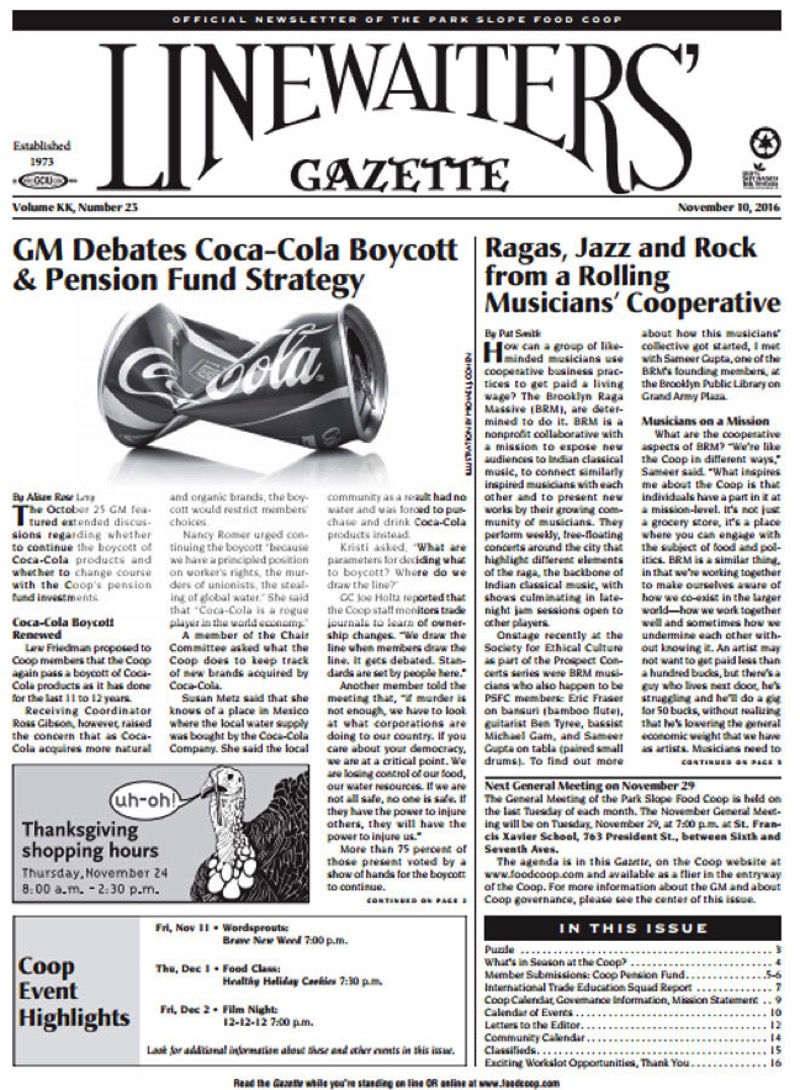
"Coca-Cola's secret plan to monitor Sydney University academic Lisa Bero" by Marcus Strom, The Sydney Morning Herald, October 22, 2016
Read Article
"Coca-Cola has been exposed having a secret plan to monitor research at Sydney University that examines how private companies influence public health outcomes in areas such as obesity.
"In a leaked internal email, a paid consultant to Coca-Cola South Pacific writes that a 'key action' for the global soft-drinks manufacturer is to 'monitor research project outcomes through CPC [Charles Perkins Centre] linked to Lisa Bero's projects'...
"Regarding the private email concerning Professor Bero's work, Coca-Cola told Fairfax it 'sees no reason to believe the email is not real'. The report covered a talk in January given by visiting US nutritionist Marion Nestle, who is a vocal opponent of Coca-Cola's influence on health research...
"When tobacco industry documents were released in the US they revealed that my work was monitored and reported on to the tobacco companies as early as 1993,' she said."
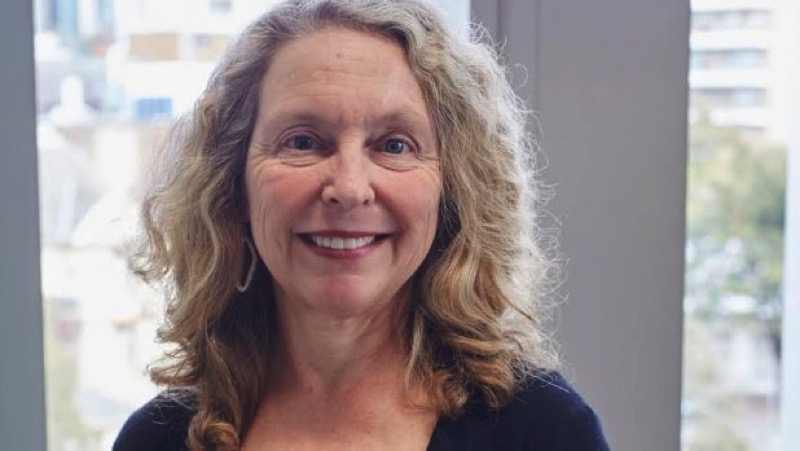
Professor Lisa Bero has been targeted for "monitoring" by Coca-Cola for her research on nutrition and bias. Photo: University of Sydney
How trendy water from Coke 'is no better than tap': Production process that adds minerals to Glaceau Smart Water 'has no benefit' by Victoria Allen, Daily Mail, October 18, 2016
Read Article
"Despite the big name backing and the apparently scientific claims, however, Glaceau has now been denounced by experts as no better than tap water...
"'The term smartwater implies it is either intelligent to drink it or it makes you more intelligent, although that it is not an explicit claim made by Coca-Cola. But there is no indication it is wiser to drink this water.'
"Glaceau's US advertising states that Glaceau is as pure as the 'first drop of rain', but she added: 'Using the term pure suggests it is going to be better for you, but the way this water has been processed is no better or worse for you than regular tap water.'"
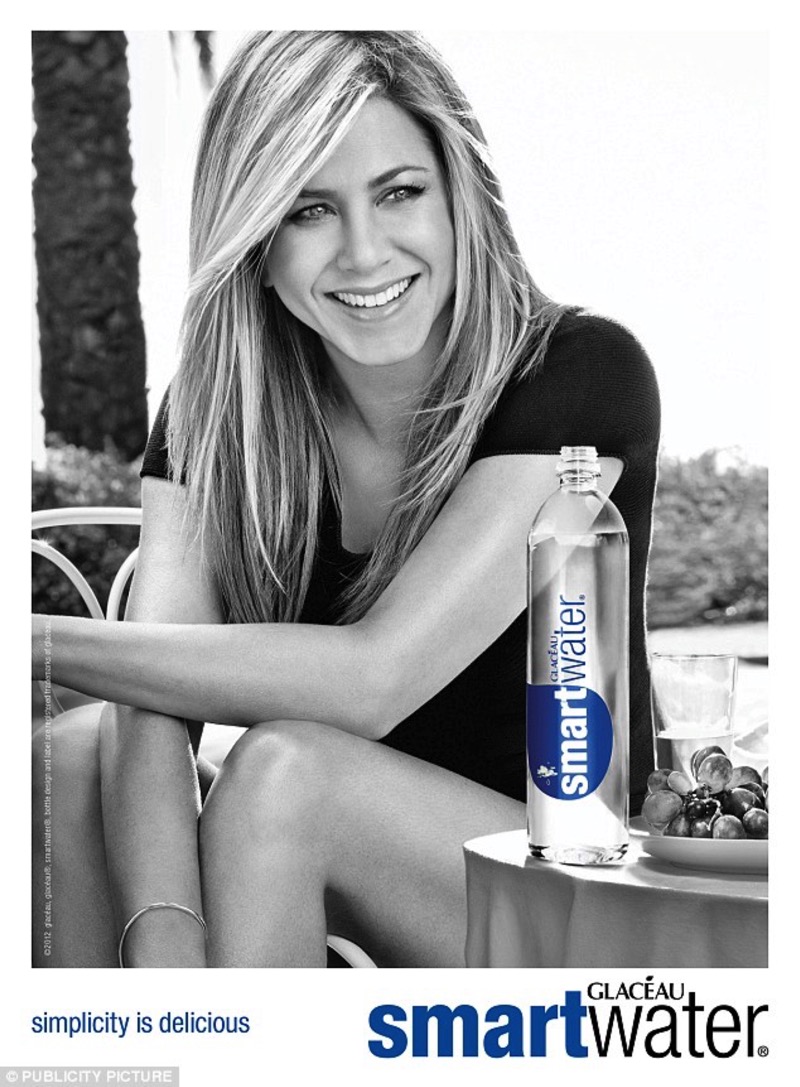
"Hacked emails show how Coca-Cola fights the soda tax at local and global levels" by Emma Courth, MarketWatch, October 18, 2016
Read Article
"Leaked internal Coca-Cola KO, +0.89% emails released by anonymous hacker website D.C. Leaks show the company's apparent effort to fight local soda tax proposals and shape media coverage on the issue...
"How aggressively companies work to thwart public health measures, especially those intended to decrease purchases of sugary beverages, especially as a substitute for other ways to hydrate, should surprise no one, especially in the case of these specific companies, experts say...
"'What I think nobody understands is the level of manipulation the companies that make these products engage in, and that's why I think these [Coca-Cola] revelations are so important,' said Marion Nestle, a New York University professor and author of 'Soda Politics: Taking on Big Soda (and Winning).'
"Topics discussed in the leaked emails, including lobbying efforts and attempts to manipulate dietary guidelines and the news media, 'aren't usually talked about in public,' Nestle said. 'But they're certainly talked about in private.' "
"Hacked Emails Show Coca-Cola Aims To Influence Hillary Clinton And The Media" by Nancy Fink Huehnergarth, Forbes, October 17, 2016
Read Article
"Good reporting revealed that Coca-Cola funds researchers, health organizations, nutrition professionals and community groups in an effort to blame obesity on a lack of physical activity, rather than diet. Hacked emails from Hillary Clinton's campaign staff, posted recently on DCLeaks, reveal that Coke works hard to influence politicians, journalists and bloggers, as well...
"Public health advocates will have their work cut out for them when it comes to soda taxes, if Mrs. Clinton wins the election...
"Bloggers and journalists are a critical barrier between corporate spin and the public. The Coca-Cola emails remind us that reporter-corporation relationships must never be more than purely professional and we must always remain on guard."
"Portugal to levy sugar tax on soft drinks in 2017; Government expects measure, which would increase price of 330ml can of Coke by 5.5c, to raise €80m for public health"
The Guardian, Agence France-Presse, October 14, 2016
Read Article
"Portugal's Socialist government will introduce a sugar tax on soft drinks in 2017 which is expected to raise €80m (£72m) for the public health service, a budget bill presented on Friday showed.
"The announcement comes just three days after the World Health Organization urged countries to start taxing sugary drinks, pointing to evidence that price rises can dramatically reduce consumption."
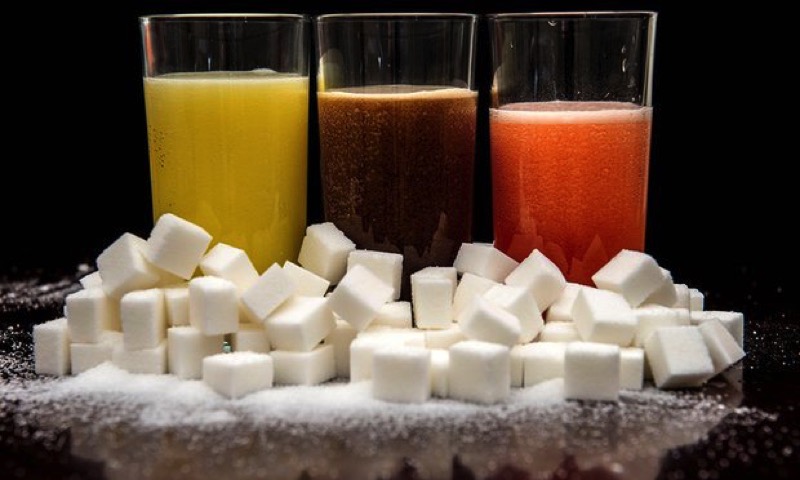
"Here Are All 96 Public Health Organizations Paid By Coca-Cola And Pepsi: Like the tobacco and alcohol industries before, the sugar industry is using its deep pockets to influence policy--and prominent groups are listening"
By Charlie Sorrel, Fast Company, October 13, 2016
Read Article
"W.H.O. Urges Tax on Sugary Drinks to Fight Obesity" by Sabrina Tavernise, The New York Times, October. 11, 2016
Read Article
"The World Health Organization on Tuesday urged countries to impose a tax on sugary drinks to battle the growing obesity epidemic and presented new data on the beneficial health effects of such a tax.
"A tax on sugary beverages raising their price 20 percent would result in a proportionate reduction in their consumption, the agency said. That would advance the fight against obesity, which has more than doubled since 1980. About half a billion adults were obese in 2014, roughly 11 percent of men and 15 percent of women."
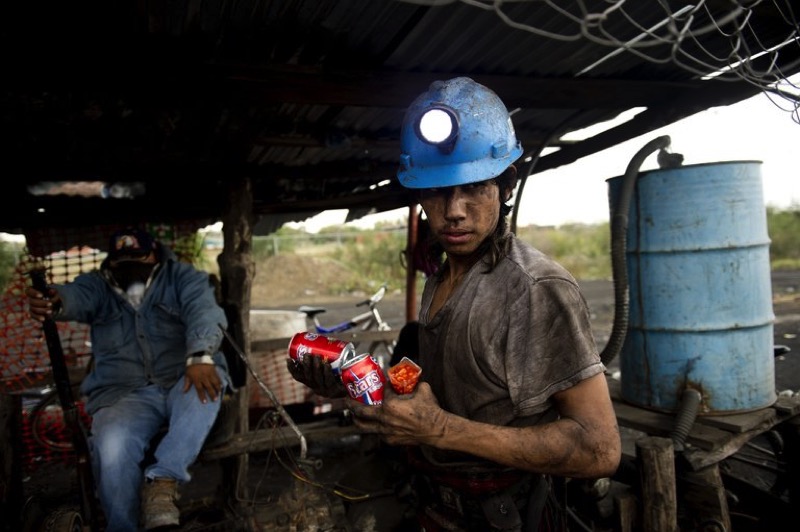
A worker carrying soda in Mexico. When the country adopted a tax on sugary drinks in 2013,
it prompted a substantial drop in consumption. Credit Yuri Cortez/Agence France-Presse — Getty Images
"California May Label Aspartame as Carcinogenic" bY STEPHEN FOX, LA Progressive, October, 9, 2016
Read Article
"Time is running out on the chance to fix something terribly wrong with America: the neurotoxic and carcinogenic artificial sweetener aspartame, whose FDA approval was forced by Donald Rumsfeld in 1981 in one of the most crooked deals in the history of the FDA.
"We have a chance to get this poison labeled under California’s Proposition 65 as carcinogenic."
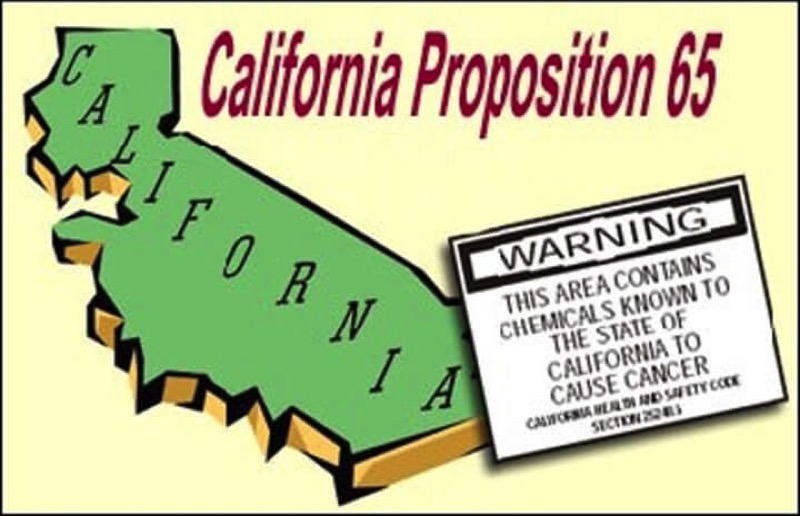
"The report contains not only the list of sponsored organizations, but also details of legislation that has been lobbied against on behalf of Coke and Pepsi. It shows just how pervasive these soda companies are in their efforts to protect their industry. Importantly, the authors excluded any health campaigns run or created by Coke of Pepsi.
"Corporate sponsorship matters, because it is believed to affect the actions of the organizations receiving the money. "Health and medical organizations would naturally be expected to promote policies that reduce soda consumption," write the authors. "However, it has been documented that a number of health organizations have retreated from this responsibility by withdrawing from public debate on policies to reduce soda consumption, opposing soda legislation, or actually collaborating with soda companies to produce joint educational materials."
"It is also a risk that sponsored organizations might feel obliged to give their sponsors spots at health conferences, allowing them to speak and influence the discussion. Corporate sponsorship from the tobacco and alcohol industries has been studied, by Siegel and others, and now that spotlight is being turned on sugar peddlers."
More on this issue, the original report, from the American Journal of Preventive Medicine
"Coca-Cola is paying dietitians to tweet scare-stories about soda taxes" by Cory Doctorow, BoingBoing, October 8, 2016
Read Article
"When registered dietitians like Roseanne Rust, Sylvia Klinger, Carol Berg Sloane tweet about proposed taxes on sugary drinks and claim that these will be used to impose 'stealth tax' on other food, promoting the anti-soda-tax group Cart Choice (funded by Coke) they're reflecting the deeply held views of the Coca-Cola company and its industry body, the American Beverage Association — and amazingly enough, they all take money from Coke or the ABA.
"Coke has a longstanding practice of paying dietitians to tout the benefits of drinking high-sugar beverages (a practice that independent scientists universally consider to be unhealthy), but the dietitians tweeting on Coke's behalf now are being especially lax about their financial ties to the company — while some disclose that they are making 'sponsored' tweets, they don't say who's sponsoring them."
"New Study Discovers Harmful Toxins in Pet Bottles of 5 Different Soft Drink Brands" by Alexa Erickson, Collective Evolution, October 8, 2016
Read Article
"The All India Institute of Hygiene and Public Health (AIIH&PH), based in Kolkata, recently commissioned a study that discovered five toxins in the PET soda bottles of five major brands, delivering a major blow to soda drinkers around the world.
"The heavy metals, which were found in two multinational companies' cold drinks (Pepsico and Coca-Cola), include: Antimony, Lead, Chromium, Cadmium, Compound DEHP or Di(2-ethylhexyl) phthalate.
"India's Drugs Technical Advisory Board (DTAB) instructed the All India Institute of Hygiene and Public Heath (AIIH&PH) to perform the study, leading to the discovering of antimony, cadmium, DEHP, and chromium in Pepsi, Coca Cola, Sprite, Mountain Dew, and 7UP. Coca Cola owns Sprite, while PepsiCo owns Mountain Dew and 7UP. The sweet beverages were all packaged in polyethylene terephthalate, or PET, bottles, the toxins from which researchers found also leached into the drinks in warmer temperatures."
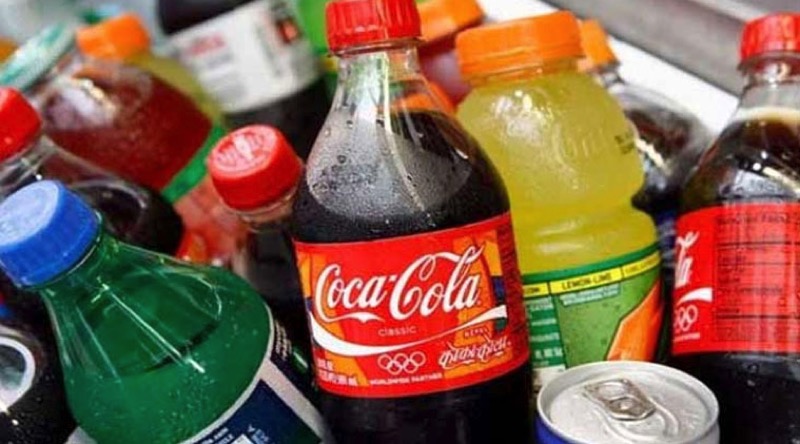
"Hillary Clinton's Coke Problem" by Chuck Ross, The Daily Caller, October 7, 2016
Read Article
"When Hillary Clinton expressed her support back in April for a hefty soda tax proposed by Philadelphia's mayor, Coca-Cola felt betrayed, and they let the Clinton campaign know it.
"'Really??? After all we've done?' was one Coca-Cola bigwig's response to Capricia Marshall, a longtime Clinton crony and major campaign fundraiser whose hacked emails were released on Thursday by the website DC Leaks.
"But that initial bout of anger gave way to coordination between the world's largest beverage manufacture and the Clinton campaign. Other emails released in the leak show that Coca-Cola executives developed an action plan to help ensure that the soda tax proposal 'would not be pushed further' by Clinton.
"The emails provide a rare look into a major company's interactions with a political campaign. They also raise numerous questions about whether Coca-Cola's lucrative financial relationship with Clinton and Marshall helped the company convince the campaign to back off the candidate's support for the soda tax."
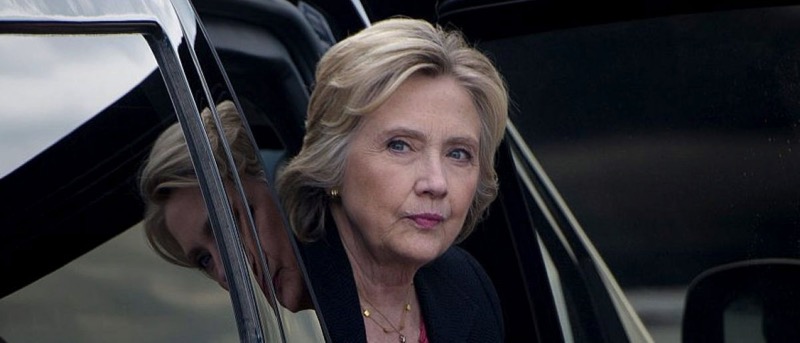
The Coca-Cola addiction of Mexico's indigenous population:
In a country with Latin America's highest death rate from diabetes, peasant communities are at risk thanks in part to Coca Cola addiction.
Portside, by David Marcial Perez, El Pais, October 6, 2016
Read Article
" 'I used to drink three one-liter bottles a day. As soon as I woke up in the morning, I would have the first glass with my tortillas, and I would continue throughout the afternoon and evening,' he says, while a rafter of turkeys peck at the ground outside his front door...
"— How did you feel after having so many soft drinks?
"— I felt very weak. I almost couldn't go out to work. It was hot in the field so I drank more Coke. But I started to notice that I was losing my eyesight and that my tongue was kind of stiff...
"At age 47, Sánchez's blood sugar level has been as high as 200mg/dL, twice the threshold for risk. Many of his neighbors are in a similar situation."
Lew Friedman
"Dairy near Rotorua pledges to stop stocking Coca-Cola products" by Will Hine, ONE News Reporter (New Zealand), September 22, 2016
Read Article
"The Okere Falls Store, near Rotorua, has put up a sign for customers, which it has also posted online, saying 'If you like fizzy drinks we want to leave a better taste in your mouth. From mid-October we will no longer be stocking Coca-Cola products'.
"The sign informs customers that plastic bottles take centuries to decompose and are poisoning the environment.
"It also says fizzy drinks should be 'as good for you as much as a fizzy drink can be' and should not be loaded with preservatives or certain ingredients."
"Marketing to Make you Sick: Coca Cola in Argentina's Schools and Hospitals" by Soledad Barruti, The Argentina Independent, September 22,2016
Read Article
"The latest report on non-communicable diseases by the Health Ministry (published in February 2016) places obesity among one of the most serious problems faced by the country, which has the regional record for obese children under the age of five. It argues that weight gain is associated with the intake of ultra-processed food and the consumption of sweetened beverages...
"The biggest company is, of course, Coca Cola, which in broad daylight passes freely through hospitals, wanders through medical offices, and tries to convince doctors not only that the company is not behind the problem, but that it is also practically the remedy."
"Censor Board Refuses to Clear 'Political' Film about Coca Cola" by the Wire Staff, The Wire, September 18, 2016
Read Article
A documentary about farmers' protests against bottling plants owned by Coca Cola subsidiaries has been denied certification on the grounds of 'political motive'.
New Delhi: The Central Board of Film Certification has refused to pass a documentary about farmers' opposition to Coca Cola bottling plants, claiming that "the film more than education, is misleading and political motive [sic]. Hence the film is not passed in its present form." The decision raises old questions about whether it is the role of the CBFC to evaluate the political validity of films placed before it.
Charlie and the Coca Cola Company is focused on two plants in Mehdiganj, north-eastern Uttar Pradesh. In 2004, farmers protested against the over-extraction of groundwater there, at close to zero cost, and its effects on the area's water table.
"Exclusive: Baba Ramdev and RSS lobbying govt to tax Coca-Cola, PepsiCo heavily" by Shantanu Guha Ray, First Politics, September 17, 2016
Read Article
New Delhi: Swadeshi warriors yoga guru Baba Ramdev and the all-powerful Rashtriya Swayamsevak Sangh (RSS) are putting pressure on the finance and health ministries to impose a heavy tax on beverage companies selling products of high sugar content, according to highly placed sources. The move could prove detrimental to the Indian operations of PepsiCo and Coca-Cola, two of the world's beverage giants.
The sources said Ramdev and the RSS are lobbying hard to introduce the tax in the forthcoming budget to be presented in January 2017.
"Man files suit against Coca-Cola
"Former employee says he was racially, sexually and religiously harassed while at the company
By Lynn LaRowe, Texarkana Gazette, September 12, 2016
Read Article
A former employee of the Coca-Cola Company on New Boston Road in Texarkana, Texas, claims he was subjected to racial, sexual and religious harassment by fellow employees, in a lawsuit filed in federal court last week.
Christopher Armstrong filed suit in the Texarkana Division of the Eastern District of Texas with the help of Dallas lawyer Christing Neill. The complaint alleges Armstrong was repeatedly subjected to slurs by co-workers who were members of his work crew. The suit specifically identifies five men who allegedly verbally harassed Armstrong during 2014 and 2015.
"Coca-Cola, acusada de financiar el terrorismo en Colombia" by Santiago Mayor, 5 Sept. 2016, RT
Read Article
ASESINATO DE LÍDERES SINDICALES
Durante los años 90 y principios del 2000, al menos nueve dirigentes sindicales de las plantas embotelladores de Coca-Cola en Colombia fueron asesinados por fuerzas paramilitares. Según consta en una denuncia internacional hecha por los propios trabajadores, la empresa fue cómplice de estos crímenes.
"La hostilidad de la transnacional de bebidas se inició en mayo de 1992, cuando el Gerente de Coca-Cola, José Gabriel Castro, acusó públicamente a los trabajadores y al sindicato de ser agentes de la guerrilla", recordó 'El Ciudadano'. En 1994 fue asesinado el sindicalista José Manco David en la planta de Carepa, dando inicio a una seguidilla de muertes.
Ya en 1996 un comando del grupo paramilitar Autodefensas Unidas de Colombia (AUC) llegó directamente a la planta y asesinó a Isidro Segundo Gil, quien encabezaba un reclamo contra la empresa. Al día siguiente, las AUC regresaron a la planta, destruyeron las instalaciones del sindicato y acamparon durante dos meses de manera intimidatoria en la puerta. Coca-Cola nunca denunció su presencia a las autoridades, en cambio utilizó la situación para despedir a otros dirigentes y rebajar el salario de los trabajadores.

Las Autodefensas Unidas de Colombia (AUC)
"Coca Cola facing terrorism support charges in Colombia" By Adriaan Alsema, Colombia Reports, August 30, 2016
Read Article
"Multinational beverage producer Coca Cola is one of more than 50 companies that will be charged with financing the now-defunct Colombian paramilitary AUC group, a designated terrorist organization.
"Several courts will reportedly forward evidence of the involvement of the companies in financing the AUC, which killed many dozens of labor rights defenders during its existence between 1997 and 2006, to a transitional justice tribunal."

"Coca-Cola's Second Largest Plant Shuts Production in India Plant Flouts Environmental Laws, Operating Without Licenses"
For Immediate Release August 18, 2016
New Delhi: Coca-Cola's second largest bottling plant in India has shut production due to pollution violations, the India Resource Center can confirm after a visit to the plant yesterday.
The closure of the Coca-Cola bottling plant located in Dasna in Hapur district in Uttar Pradesh, just 60 kilometers from New Delhi, was first reported by The Economic Times on August 11, 2016.
The bottling plant in Hapur has been under scrutiny by the National Green Tribunal — India's Green Court— since 2015, and a number of inspections by government regulators have found the plant to be flouting environmental laws in India, and also operating without valid licenses, or No Objection Certificate (NOC).
Egregious Pollution
Coca-Cola has had ample time to rectify the pollution violations, and the company has had prior notice before inspections. Yet, the Central Pollution Control Board (CPCB), India's top environmental regulatory agency, and the Uttar Pradesh Pollution Control Board (UPPCB), the state's primary environmental regulatory agency have continued to find serious pollution violations by the Coca-Cola company, including:
- Operating without a valid license, or No Objection Certificate, both in 2015 and currently in 2016
- Of the two Effluent Treatment Plants at the plant (one for medium and the other for high strength organic wastewater), the ETP for the high strength organic wastewater was not working and in "defunct" state
- Discharging wastewater into a pond located 1.5 kilometers from the plant which has been found to be faulty in design
- Encouraging farmers to use the water from the pond for irrigation, even as pond water tested found "it is not complying the general standards in respect to TSS, COD, BOD and Coliforms." Fecal Coliform, an indicator of raw sewage, was found to exceed the standard by 3,400 times in the pond water!
- The boilers and the diesel generator sets in the plant were violating air pollution laws
- The plant has two Sewage Treatment Plants and both were "non-operational and in the junk state"
The shocking findings led the CPCB to recommend in December 2015 that the bottling plant's juice production line cease operations because the high strength organic waste was not being treated properly. CPCB also recommended that alternative arrangements for safe drinking water be made for residents in the area, applying the polluter pays principle if necessary, since the groundwater has been contaminated with sewage from the untreated effluents.
Hazardous Pollution Continues, In Spite of Warnings
In the most recent report submitted to the National Green Tribunal last month (July 2016), and also seen by the India Resource Center, regulators continued to find problems with Coca-Cola's pollution management practices
Some of the problems noted in the latest report including sludge "NOT handled in a scientific and manner", "sludge drying beds and storage of sludge are not as per norms", and "maintenance of the pond is not proper and location of the inlet and outlet are at the same corner, resulting in immediate discharge and overflow of the effluents, and a number of other continued violations."
Coca-Cola's plant is Hapur is categorized as a highly polluting unit that generates hazardous waste. The latest report also sounded alarm regarding Coca-Cola's handling of hazardous waste, stating that the room for storage "is not designed in a scientific manner." The report notes that all the drums meant to store hazardous waste were in "rusted condition" and "even the bottoms of some of these drums have been detached due to corrosion."
The report by CPCB goes on to state that, "it was established that this storage is constructed only for eye-wash purposes", noting that Coca-Cola could not even provide documents to prove that the hazardous waste generated are sent to an authorized hazardous waste treatment facility, as is required by law.
Coca-Cola — Habitual Polluter in India
CPCB's troubling findings are not surprising— Coca-Cola is a habitual violator of pollution norms in India.
The same plant in Dasna was also found to be violating pollution norms by a Wall Street Journal investigation in 2005, and Coca-Cola officials admitted wrongdoing to the reporter.
In 2003, CPCB found high levels of heavy metals — lead, cadmium, chromium — in most of the waste tested from Coca-Cola bottling plants, including this plant in Dasna which was found to have excessive levels of cadmium and chromium in its sludge.
Coca-Cola's bottling plant in Plachimada in Kerala was shut down by government regulators in 2005 for heavy metal pollution.
The same year, BBC's Radio 4 tested sludge from Coca-Cola's plant in Plachimada which was being distributed to farmers as fertilizer, and found it to contain excessive levels of cadmium and lead. In 2007, a team including the India Resource Center visited a Coca-Cola franchisee pIant in Ballia in Uttar Pradesh and found illegal dumping of waste across the premises. In 2008, the CPCB also tested waste from Coca-Cola plants at different locations to understand the constant source of heavy metals in Coca-Cola waste, and linked it to the ink used in the logos painted on the bottles.
"The arrogance and incompetence of this company is beyond belief", said Amit Srivastava of the international campaigning group, India Resource Center. "The company has been given enough notices to clean up its act but it still refuses to do so in India, and operates without the necessary licenses. The plant should be closed permanently, and the government must move to force Coca-Cola to compensate the community in the area who will bear the brunt of Coca-Cola's pollution for years to come, as well as workers in the plant who will lose their jobs through no fault of their own."
For more information, visit www.IndiaResource.org
Contact: Amit Srivastava +91 98103 46161 (India)
"CDC Executive Resigns After Being Caught Colluding With Coca-Cola to Salvage Soda Market" by Dr. Mercola, July 12, 2016
Read Article
"I've often written about the collusion between industry and our regulatory agencies, and how industry-funded research tends to simply support and promote the industry agenda rather than shed truthful light on the benefits or risks of any given product.
"Recent media reports have now revealed devastating evidence showing a Centers for Disease Control and Prevention (CDC) executive aided a Coca-Cola representative in efforts to influence World Health Organization (WHO) officials to relax recommendations on sugar limits...
"It's the ultimate betrayal of trust.
"Story at-a-glance:
- "Email evidence shows a Centers for Disease Control and Prevention (CDC) executive aided a Coca-Cola representative in efforts to influence World Health Organization (WHO) officials to relax sugar limits
- "Last year, WHO announced soda is a key contributor to child obesity, suggesting restrictions on sugary beverages
- "Two days after Barbara Bowman, Ph.D., director of the CDC's Division for Heart Disease and Stroke Prevention (DHDSP), was exposed for offering guidance to leading Coca-Cola advocate, Bowman resigned from her post
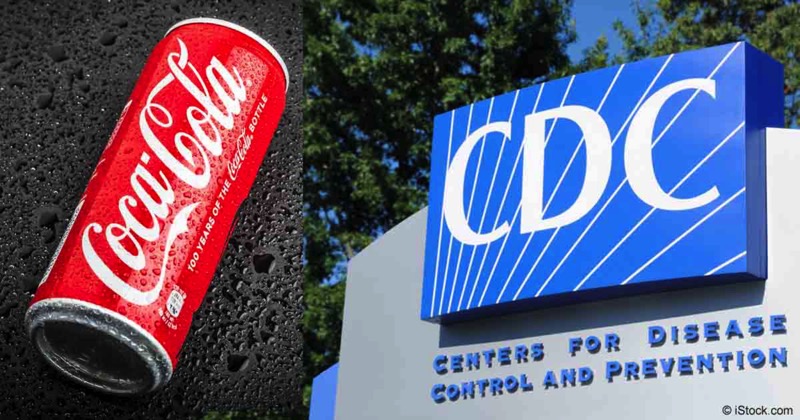
"Aspartame Is Linked To Leukemia And Lymphoma In Landmark Study On Humans," Daily Health Post, July 8, 2016
Read Article
DO NOT drink or eat anything with the artificial sweetener, aspartame. In the past we've posted articles linking aspartame with stroke. Here's a new study linking aspartame with leukemia and lymphoma.
And:
"Oh, and by the way: regular soda is just as bad as diet.
"High-fructose corn syrup (the primary sweetener in most non-diet sodas) causes cancer, heart disease, obesity, and dementia, too."
The article goes on to recommend:
"If you need a sweet drink, try fruit-infused water and mixing honey or maple syrup with water or club soda (real club soda that contains only water and bicarbonate of soda). If it's the push of caffeine you want, drink coffee, black tea, matcha, or yerba maté. But by all means, kick the killer soda habit."
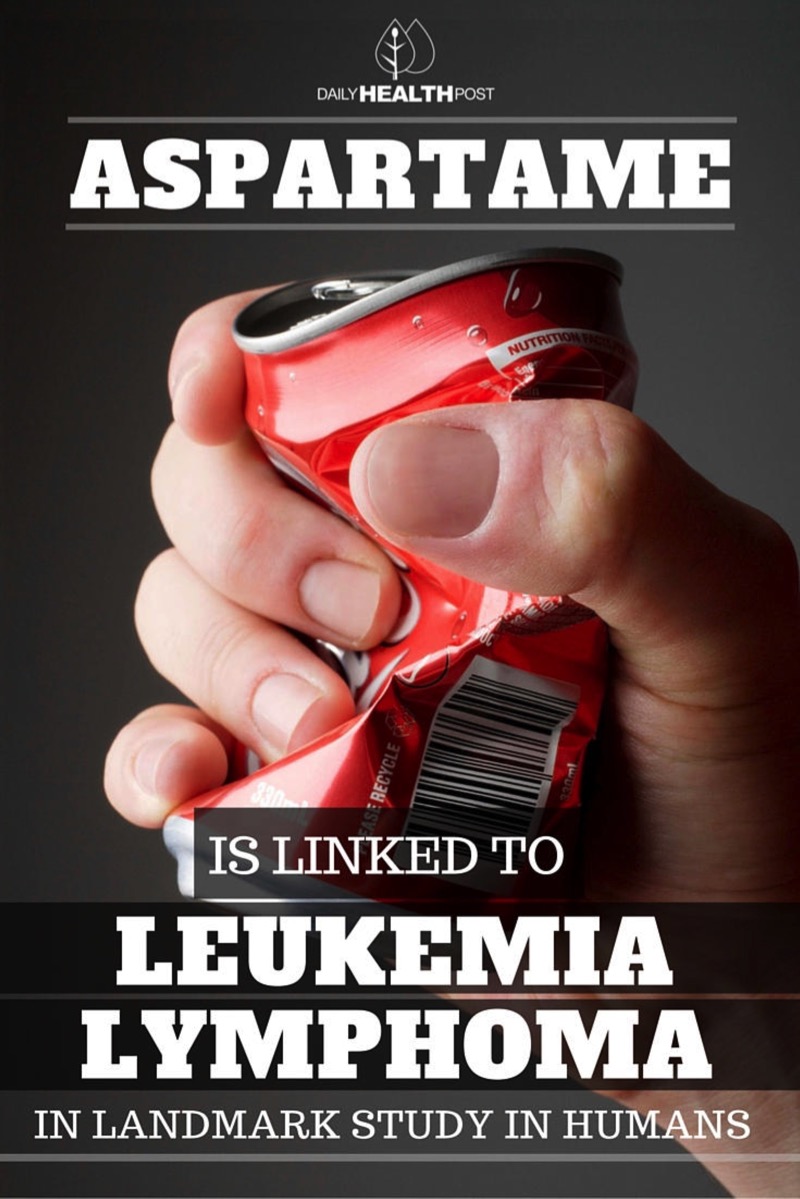
"Soda Tax Passes in Philadelphia. Advocates Ask: Who's Next?" by Margot Sanger-Katz, The New York Times, June 17, 2016
Read Article
It was passed as a revenue measure, not a health measure, but it will have positive health results. It was mentioned that sugary beverages have received a bad reputation over the past years.
"...Though city officials didn't talk much about the health consequences of soda, experts said that sugary drinks' increasingly bad reputation made it an appropriate political target."
"Sugary drinks like Lucozade and Coca-Cola must be named and shamed to protect children" by Miriam Stoppard, Mirror, June 13, 2016
Read Article
"...Liverpool City Council is naming and shaming heavily sugared drinks, such as Lucozade and Coca-Cola, to warn parents about the dangers they pose.
"Public health officials in the city hope their tough tactics will drive down sales of products with 'astounding' amounts of sugar which they blame for giving the city one of the UK's highest rates of childhood obesity and tooth decay."
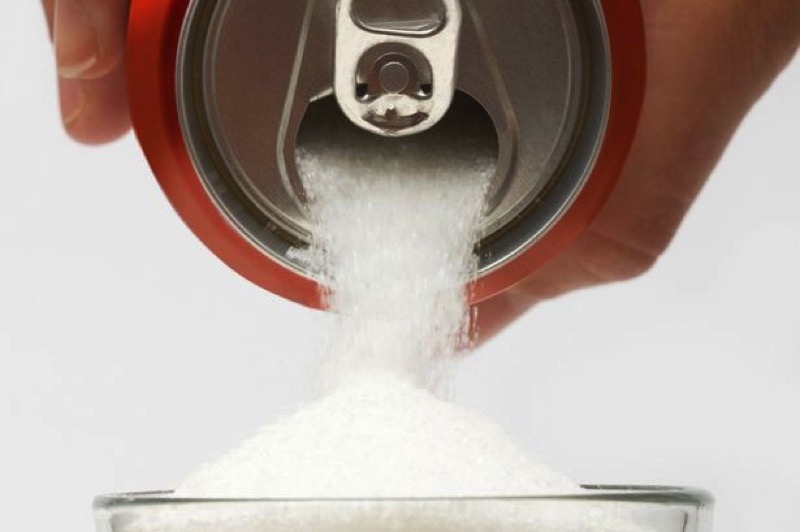
"Coca-Cola faces case under SC/ST Act in Kerala" by PTI, The Economic Times, June 12, 2016
Read Article
"PALAKKAD: Kerala Police has registered a case against multi-national soft-drink major Coca-Cola for allegedly exploiting and polluting groundwater sources of the backward Scheduled Caste community at Plachimada here."
"Will Philly's Soda Tax Make Coca-Cola the Next Philip Morris?
"Smoking bans started at the state and local level, too — then spread across the country."
BY Holly Otterbein, Philadelphia, June 9, 2016
Read Article
"In 1973, Arizona became the first state in America to restrict smoking in some public places. Four years later, Berkeley, Calif., became the first city in the nation to limit smoking in restaurants and other public places. Soon thereafter, the state of California, San Francisco and New York City enacted their own smoking bans. Fast-forward to today: Thirty states and 812 municipalities have smoke-free laws on the books.
"A few decades from now, will we look back and remember Philadelphia as the city that paved the way for governments across the country to tax soda, much like Arizona and Berkeley did for smoking bans?
"That's what some sugary drinks tax advocates predict, and they make a pretty convincing case."
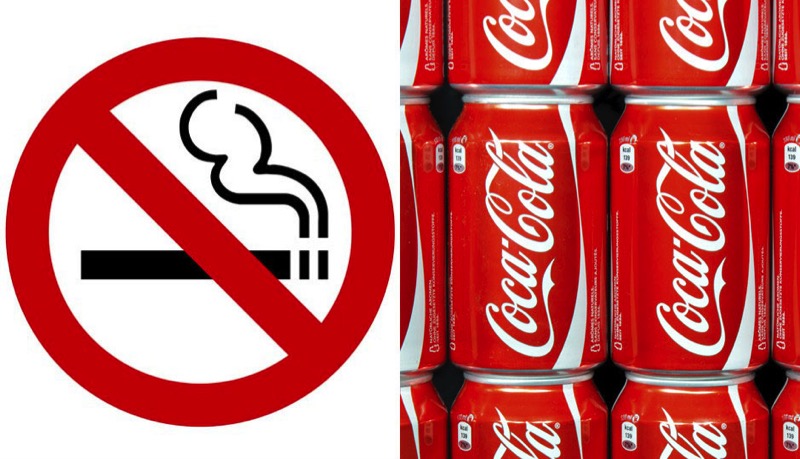
"Buffett made five mistakes in laughing off the Coca-Cola question" by Michael Skapinker, Financial Times, May 4, 2016
Read Article
"Many shareholders had queries about Coca-Cola, which is 9.3 per cent owned by Berkshire Hathaway. Andrew Ross Sorkin, the author, asked the questions on their behalf. Mr Buffett was opposed to investing in cigarettes, even though they were addictive and profitable because of 'societal attitudes'. Yet a Tufts University study had concluded that sugared drinks may lead to an estimated 184,000 adult deaths a year. Mr Sorkin said: 'Please explain directly why we Berkshire Hathaway shareholders should be proud to own Coke...'
"In March, George Osborne, the UK chancellor, announced a tax on these drinks, saying: 'I am not prepared to ... say to my children's generation: "I'm sorry. We knew there was a problem with sugary drinks. We knew it caused disease. But we ducked the difficult decisions and we did nothing."
"There are sceptics who do not take these Coke activities seriously, seeing them as a cover for the continued sale of highly profitable and health-damaging drinks. Mr Buffett's jocular response to his shareholders did little to rebut this view."
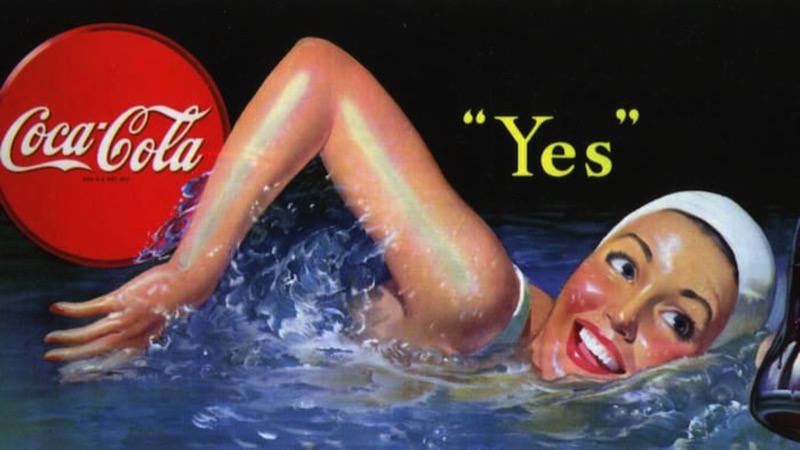
"Coca-Cola items: Warren Buffett's gaffe. Share a Coke and a Song." by Marion Nestle, Food Politics, May 2016
Read Article
He [Warren Buffett] also said he drank 700 calories worth of Coca-Cola each day (translation: 44 teaspoons of sugars). As Michael Jacobson of the Center for Science in the Public Interest put it, this much sugar is not in the interest of anyone's health.
Maybe the Wizard of Omaha can maintain good health while consuming more than three times the added sugars recommended by the nation's leading health officials, but it's a sure-fire prescription for increased risk of diabetes, heart disease, obesity and tooth decay for the rest of his fellow citizens...the American Heart Association whose scientific panels have reviewed the evidence as well call for an even more conservative daily limit of added sugars: six teaspoons for women and nine for men.
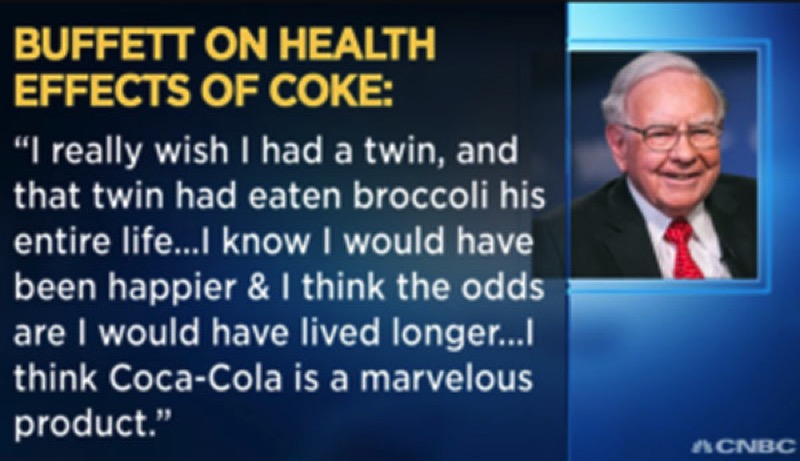
Ray Rogers Questions Coca-Cola Chair/CEO Muhtar Kent on Coca-Cola Child Labor Crisis
Ray Rogers Questions Coca-Cola Chair/CEO Muhtar Kent on Coca-Cola Child Labor Crisis
April 27, 2016 Annual Meeting of Shareowners
Mr. Kent,
Congratulations. Holding the annual meeting at the World of Coca-Cola and Coca-Cola Shareowners Day is a brilliant idea. I'm also pleased that the company acted positively on the Proxy Access Director Resolution I introduced on behalf of Harrington Investments last year.
Now, please answer the following questions:
Are there any videos, photos or displays in the World of Coca-Cola showing the unhappiness, misery and hopelessness on the faces of thousands of children involved in the dangerous harvesting of sugar cane for Coke's sugar processors? I would expect the answer is no.
Doesn't exploiting hazardous child labor for profit, and continuing to aggressively market soda to children, make a mockery of the company's Codes of Responsible Business Conduct? I would say yes.
Last year, you refused to answer a simple yes or no question, so I'll ask it again:
Will Coca-Cola agree to pay its sugar processors and suppliers enough money so they can pay fair wages to poverty-stricken sugar cane harvesters, and Will Coca-Cola assure the rights for sugar cane harvesters to form and join labor unions so they can negotiate fair wages and working conditions?
If you answer yes, you will make it possible for the children to be in schools, libraries and playgrounds rather than laboring in scorched plantation fields and the part of the world with a conscience, including myself, will applaud you.
I must also ask: How many meetings have taken place between Coca-Cola and the American Federation of Teachers regarding the Coca-Cola labor crisis? and How and to what extent have these meetings led to improving the lives of the workers and children harvesting sugar cane?
++++++++++++++++
Follow-up letter to Brent Wilton, Director, Global Workplace Rights, The Coca-Cola Co.:
Hi Brent,
Glad we had a chance to speak at the annual meeting. As with Ed Potter, I'm always open for discussion to help resolve matters that the Campaign highlights at the annual meetings and on our website.
The questions that I raised at the meeting that you said you would respond to in more detail were:
"How many meetings have taken place in the past year between Coca-Cola and the American Federation of Teachers regarding the Coca-Cola child labor crisis?" and "How, and to what extent, have those meetings led to improving the lives of the workers and children harvesting sugar cane?"
Brent, you have a very friendly persona like Ed and I'm sure we can continue to communicate in a way that may help to resolve some burning issues.
Cheers,
Ray
"Greenpeace protesters arrested after scaling iconic Coca-Cola sign in Sydney's Kings Cross," 9News, March 23, 2016
Read Article
"Seven Greenpeace Australia protesters have been arrested after they scaled the iconic Coca-Cola sign in Sydney's King Cross this morning.
"The protesters attempted to hang a large banner reading 'Stop Coke Trashing Australia' from the sign at around 8am.
"Greenpeace Australia said today's action was in an effort to urge NSW Premier Mike Baird to stand up to the soft drink giant by adopting a better recycling scheme for drink bottles and cans."
"What Does Coca-Cola Do to a Flower?" by Dr. Andreas Eenfeldt, Diet Doctor, March 22, 2016
Read Article
"What happens if you only drink Coca-Cola instead of water? The result may not be quite as quick as for the flower, but the end result, decades later, may not be that much better for humans.
"Obesity and tooth decay is just the beginning. Diabetes may come next, followed by heart disease, Alzheimer's and possibly cancer."
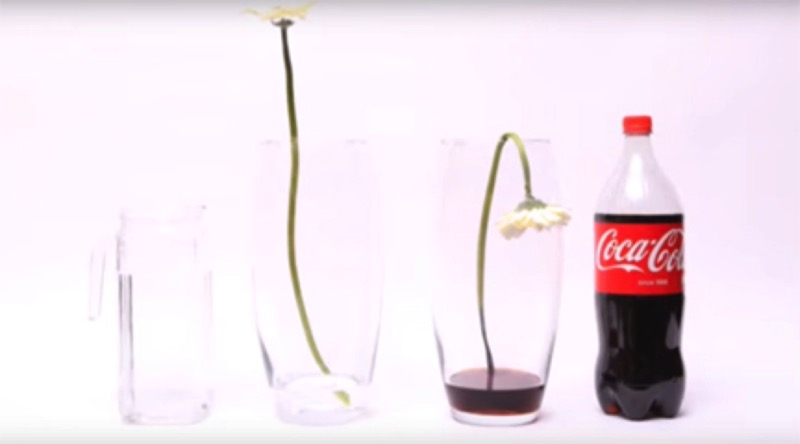
"Coca-Cola and Pepsi are depending on 'the marketing trick of the century' to save business" by Kate Taylor, Business Insider, Feb. 13, 2016
Read Article
"'Bottled water is the marketing trick of the century,' writes John Jewell in The Week ...
"However, while bottled water can cost 2,000 times as much as tap water, the beverage yields surprisingly low profit margins for companies. So these beverage giants are not only investing in simple bottled tap water — the most straightforward marketing trick in existence — but also new, pricier takes on the classic H2O...
"Bottled water is a $13 billion business that, logically, doesn't need to exist.”
